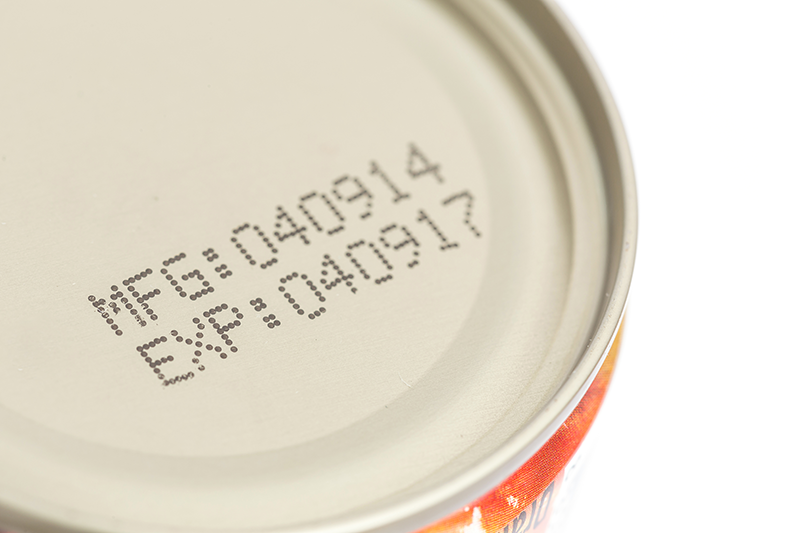FDA Calls for Simpler Expiration Dates to Cut Down on Food Waste
May 31, 2019
We’ve all felt that we had to throw away groceries at some point. After all, the dates printed on the packages of our food are there to warn us, right? Well the truth is that most of these “expiration dates” have little to do with the safety of our food, and more to do with flavor and freshness. The FDA is calling for labels that make that message a bit more clear in an effort to curtail household food waste.
On Thursday, the Food and Drug Administration (FDA) issued a letter encouraging food companies to uniformly utilize a “Best if Used By” label on all products. The intention is to eliminate confusion for consumers by diminishing the variety of descriptions printed on food products. Currently, companies use over 50 descriptions on grocery items with dates to indicate their prediction of the items’ decline in freshness.
The belief is that the wide array of descriptions on the date-labels is a major cause of food waste in homes. With people confusing freshness dates for expiration dates, it’s estimated that about 42 percent of food waste occurs in consumers’ homes; while restaurants and grocery stores account for roughly 30 percent and 10 percent respectively. Just as everyday consumers are trashing food needlessly, grocers and restaurateurs are wasting food due to the fear of selling spoiled items, or using spoiled groceries in cuisine served to clientele.
How to Read Expiration Dates on Food

Many consumers are reluctant to eat or serve foods passed the esoteric dates that are printed on the packaging simply because they aren’t sure what the date is suggesting. Some of the most common date labels being used currently are:
- Use By Date: This is the day that the manufacturer suggests using the food by in order to guarantee the best taste and freshness. This date is only a recommendation to ensure best quality. The item may be eaten after this date safely, but the quality may not be as good as the when the food was purchased.
- Sell By Date: This date is intended to dictate the end of an item’s shelf life at a store. Once an item passes the “Sell By” date, food retailers are supposed to remove the item from stock. While it’s usually safe to consume food passed the “Sell By” date, it’s not recommended to purchase items that have passed the date on this label.
- Best if Used By Date: This label is meant to identify the date at which a food item begins to decrease in quality. Items eaten passed this date may not taste as well or may begin to alter in texture, but will still be safe for consumption. This is the label the FDA is pushing manufacturers to use more often in hopes that more people will feel comfortable eating food passed the printed dates, rather than throwing them away.
These dates are not intended to be food safety dates and are not legally regulated in any way. Manufacturers place the dates on food items based on their own estimations. The dates are meant to help retailers decide how long to keep food items on display, and to guide consumers as to when to use food items for best quality.
Foods That Never Expire
Many people throw food products out simply because they’ve had them in their cupboard so long they assume the items must have gone bad. However, there are many foods that don’t expire, or remain healthy to eat for a very long time. Such items include:
- Honey: Honey is basically immortal. Bees break down flower nectar into simple sugars mixed with enzymes from the bees themselves. This creates a low moisture substance that, when properly sealed, is impervious to bacteria.
- White Rice: Uncooked white rice stored in an airtight container can last for 30 years without compromising nutrients or flavor. An article by Still Tasty states that several types of rice can be kept and consumed indefinitely. The main exception to this rule would be brown rice. Due to the natural oils in brown rice, it’s shelf life extends to roughly six months.
- Cornstarch: Kept in a cool, dry place, cornstarch will last for many years. The only issue is moisture. As long as it doesn’t get wet, cornstarch will basically never expire.
- Salt: Pure salt will never expire. Salt is often used to keep other foods from expiring, as the salt draws the moisture from other foods; preventing bacteria from forming. However, iodized salt should only be expected to last for five years, because the iodine reduces the shelf life significantly.
- Vinegar: Because of the acid content, vinegar is a self preserving food item that needs no refrigeration and has no expiration date. White vinegar, apple cider vinegar, balsamic vinegar, raspberry vinegar, rice wine and red wine vinegar are safe for life.
- Sugar: Much like salt, sugar can last forever if kept away from moisture and heat. Powdered and granulated sugar should be kept in airtight containers, but even brown sugar, raw sugar, and sugar substitutes never really expire. Some may change texture over time, but are always safe to ingest.
- Dried Beans: Dried legumes (beans) that are kept sealed can last forever. Researchers at Brigham Young University found that, after 30 years, all the samples of dried beans were still safe for consumption. Older beans simply take longer to cook.
- Pure Maple Syrup: Unopened maple syrup will never expire. Though, once opened, it must be refrigerated.
- Soy Sauce: As long is it’s refrigerated, soy sauce will be safe to eat for many years. If unopened, soy sauce will never expire.
- Pure Vanilla Extract: Pure vanilla extract contains enough alcohol to preserve itself for a very long time. Imitation vanilla extract does not have as much alcohol, so it’s shelf life is much shorter. As long as it remains properly sealed to prevent bacteria from entering the bottle, pure vanilla extract will last far longer than one might think.
How Long is Milk Good After Expiration Date

Milk last between four and seven days passed the printed date. The obvious indicator would be the “smell test”. If milk smells sour, it’s best to throw it away. A milk expiration date is one of the more serious food expiration dates out there, because milk has a very short period wherein it’s safe to consume.
How Long are Eggs Good After Expiration Date
Raw eggs will last between four and five weeks passed the date printed on the carton. A good rule of thumb is to use eggs within a month of purchase. If an egg looks or smells strange, it should not be used. Once again, the “smell test” is best for eggs one is unsure of eating. An egg cracked into a bowl can be tested for odor easily.
FAQ About Food Expiration
These are some of the frequently asked questions about foods and their expiration:
- Does Water Expire? Water itself does not expire. Water bottles have expiration dates because the plastic bottles will eventually begin to leach chemicals into the water. This will not make the water harmful to ingest, but will affect the taste.
- Does Tea Expire? Tea bags are safe to use for a very long time. The flavor quality may deplete over time, but they’ll never be unhealthy unless they grown mold from being wet.
- Does Honey Expire? As discussed above, honey that is properly jarred and sealed will last indefinitely.
- Does Chocolate Expire? Chocolate will expire. If it looks, smells, and tastes right, it is safe to eat. If the chocolate is becoming patchy and pale, it’s best to discard it.
- Does Coffee Expire? Unless it becomes moldy, coffee will be safe to drink. Older coffee will lose quality in taste, but will not be harmful to drink.
- Does Butter Expire? The oils in butter will become rancid if left in room temperature for long. Frozen butter will last about six months. Refrigerated butter will last for roughly a month past purchase.
- Does Flour Expire? Flour will last roughly six to eight weeks passed the printed date. After this point, expired flour will taste and smell rancid.
- Does Peanut Butter Expire? Peanut Butter will keep for about a year, but will eventually expire. Oxygenation breaks down the fatty oils and makes the product rancid.
Expired Canned Food
Another common question people have is about canned food expiration dates. While these items do have “Best Before” or “Best By” dates, people still wonder, “Does canned food expire?”. The answer is a simple “No”. According to Janell Goodwin, a technical information specialist with the U.S. Department of Agriculture’s Food and Safety Inspection Service,“Due to tightly controlled procedures of commercial canning, cans that are in good condition are safe indefinitely and will never make you sick, even if the best-by date passes during home storage.”
Experts say that properly stored canned food is safe forever. When dealing with “Best By” or “Use By” dates on canned food, it’s a quality issue rather than a health issue. Since canned food items don’t really expire, it’s perfectly safe to take advantage of sales on can goods in grocery stores that are passed their printed date. Just be sure to check for dents in the can and be sure the can is properly sealed.
FDA Recommendations
The FDA issued its letter to food manufacturers in an effort to make labeling less confusing to consumers in order to drive down food waste statistics in the U.S. “Imagine this: You go to your favorite supermarket and come out with three bags full of groceries. Before you get in your car, you toss one of those bags in the garbage. Sound ridiculous? Of course it does, but that’s in essence what food waste looks like every day across our country,” said Frank Yiannas, the FDA’s Deputy Commissioner for Food Policy and Response, in a statement released Thursday.
The FDA is urging consumers to recognize that the dates printed on their food do not indicate spoilage. The stand-out exception to this rule is with baby food. The FDA has a long standing mandate that all infant formula products be labeled with a “Use By” date; this is to ensure safety and quality of such items.
Independent grocers and restaurant owners may want to consider the FDA’s letter to the food industry, as keeping food with these quality labels in rotation will cut down on waste and save small businesses money. Grocers can make special sales prices for items nearing or passed their quality label date. Restaurant owners can use food items that they may have previously deemed “expired” without fear while also remembering that items like, vinegar, salt, rice, and beans have an extremely long shelf life.




